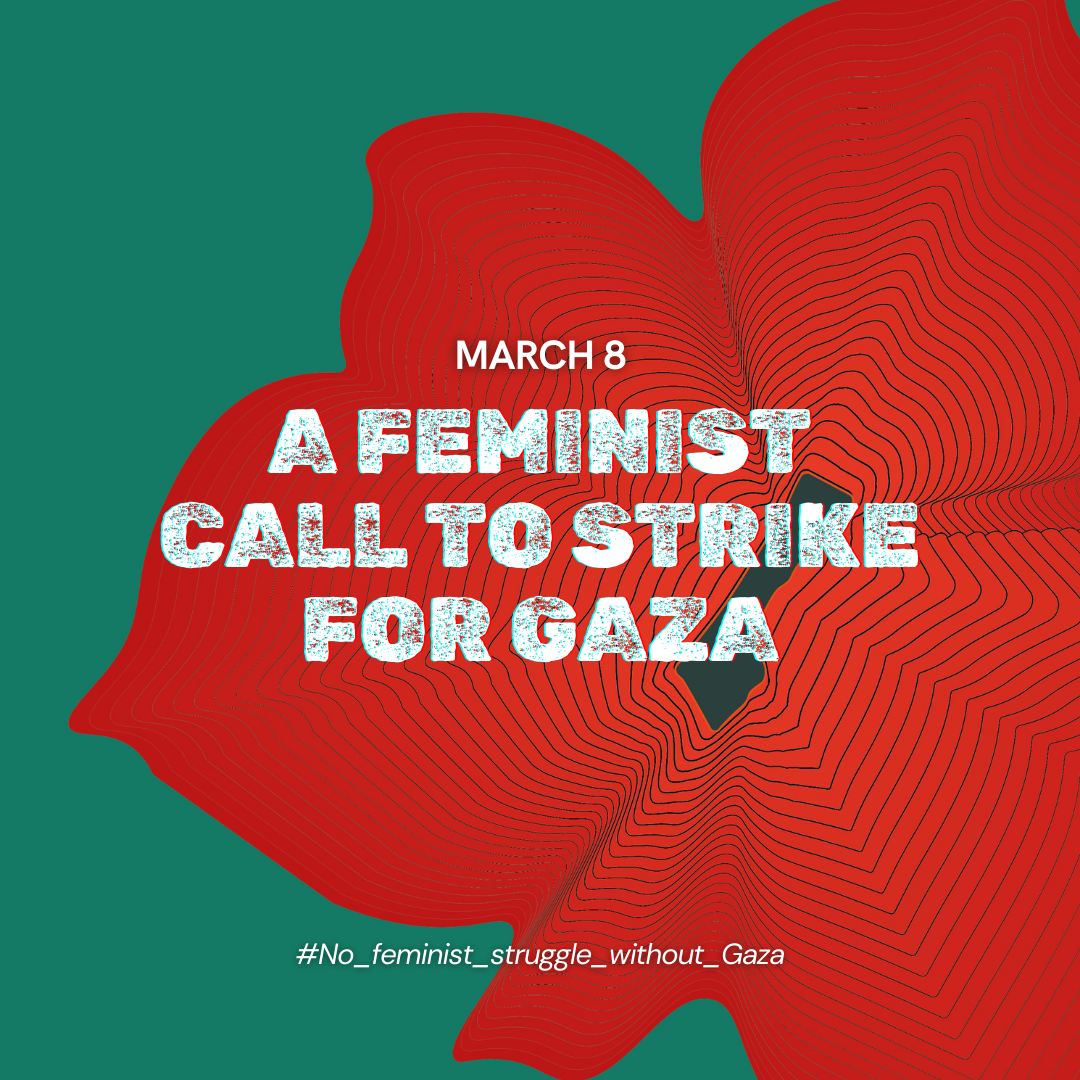International Women’s Day of Resistance
Friday, March 8, 2024
This International Women’s Day we answer the call from Palestinian feminists to resist the British state’s collusion with Israel in the ongoing genocide. We take instruction from the rich history of the Palestinian women’s movement, a movement that exists despite settler colonial fragmentation through occupation of the West Bank, besiegement of Gaza, settlement of ’48 and incarceration across seventy five years of the Israeli state. We follow in the footsteps of freedom fighters like Leila Khaled and Shadia Abu Ghazalah, whose participation in armed struggle against occupying forces reminds us of the rich and varied nature of feminist resistance. We recognise this revolutionary spirit in the present day Tal’at movement, who fight, like us, for an end to femicide, exploitation, domestic and state violence. Today, we honour the origins of International Working Women’s Day. FREEDOM OVER EQUALITY.
Feminism means an end to the occupation, an end to arming the settler-colonial Israeli occupying forces who murder and maim Palestinian people with impunity. An end to the devastation caused by starvation, disease, assault, aerial bombardment, and exile. This IWD, we note how gendered and sexual violence has always been central to settler colonialism: Israeli occupiers have, for decades, consistently used sexual harassment, degradation, and torture on Palestinians as a weapon of war. They proudly loot and rifle through the intimate belongings of Palestinians. Hundreds of Palestinian women have been violently sexually assaulted. Alongside this, we witness how the decimation of healthcare infrastructure has caused unspeakable reproductive horrors. Living in tents under siege, under constant threat of bombings and starvation, pregnant women are forced to give birth under horrific circumstances without pain medication, dehydrated and injured, in unsanitary and unresourced maternity hospitals and on the street. Susan Abulhawa’s words haunt us, “The reality on the ground is infinitely worse than the worst videos and photos that we’re seeing in the West.” Entire bloodlines are being erased. The scale of the destruction is unfathomable.
Feminism is not about smashing glass ceilings or climbing the corporate ladder. The freedom we desire will abolish hierarchy. Womanhood does not absolve participation in genocide because identity is no guarantee of a shared political ethic. We reject the notion that women cannot be perpetrators of violence and that colonised men are our enemies; we have seen how easily the British State has conscripted women into the state-sanctioned annihilation of the Palestinian people. We know our history: groups like The Organisation of Women of Asian and African Descent and the Brixton Black Women’s Group, in their historic solidarity with anti-colonial struggles in Kenya, Chile and Mozambique, instruct us to strengthen and solidify our connections with struggles for freedom across the world. We stand with the Palestinian feminist resistance, we honour the Martyrs. We acknowledge how gendered labour has kept many alive during the last five months of genocide.
We answer the call from our Palestinian sisters and siblings across borders and join their struggle by committing to the disruption of business-as-usual operations, against the architects of genocide who maintain our complicity. We are against violence on our streets so we are against violence anywhere in the world. This International Working Women’s Day, we remember to fight for the living. We remember to lift the names of Palestinian women who are forced to fight for their liberation right now. There are so many names we do not know, whole words that have been crossed off the census. Women who are tethered to communities, families and each other are now displaced in the Gaza Strip. They are in the occupied West Bank, resisting the illegal settlements, settler violence and encroachments on Palestinian land.
Today, on March 8th, we share just 9 examples of the countless Palestinian women who have fought for their liberation from the settler-colonial Israeli project by participating in different arenas of struggle and so inspiring revolt in others. See their struggle and stand with them against the tyranny of occupation, famine and genocide. See their spirit and be moved to action against the architects of genocide in the United Kingdom and occupied Palestinian territories.
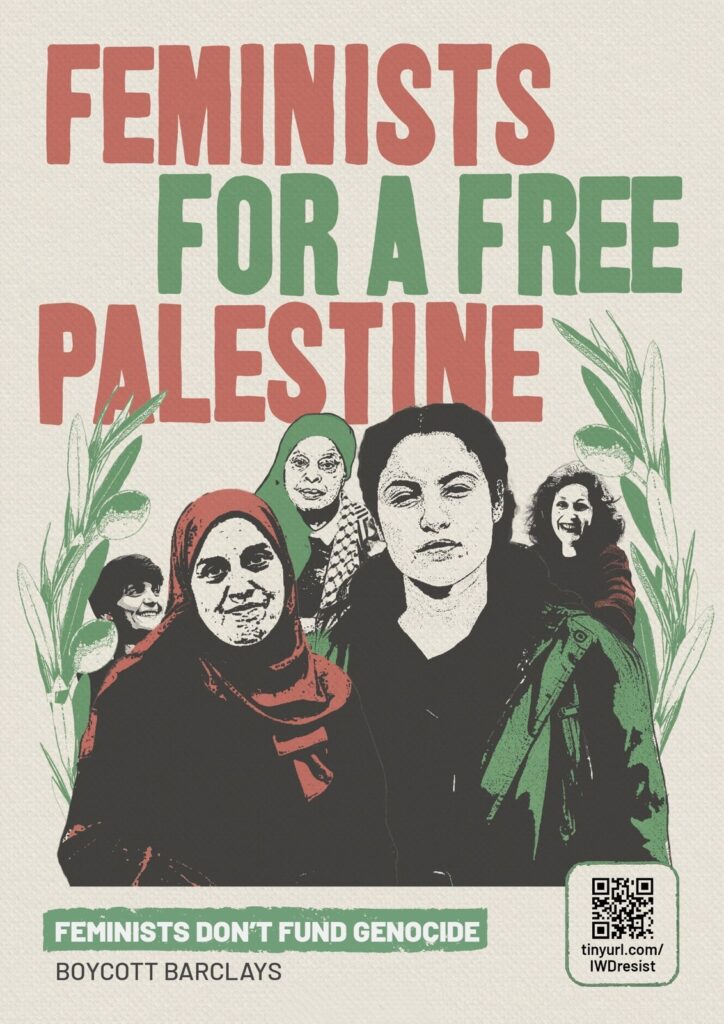
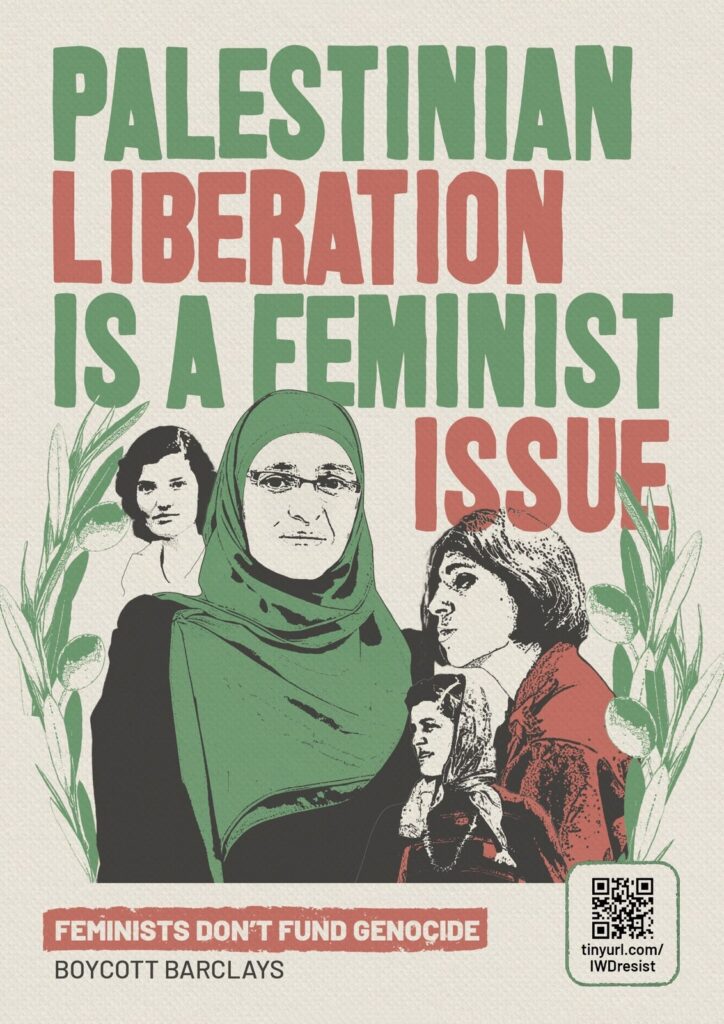
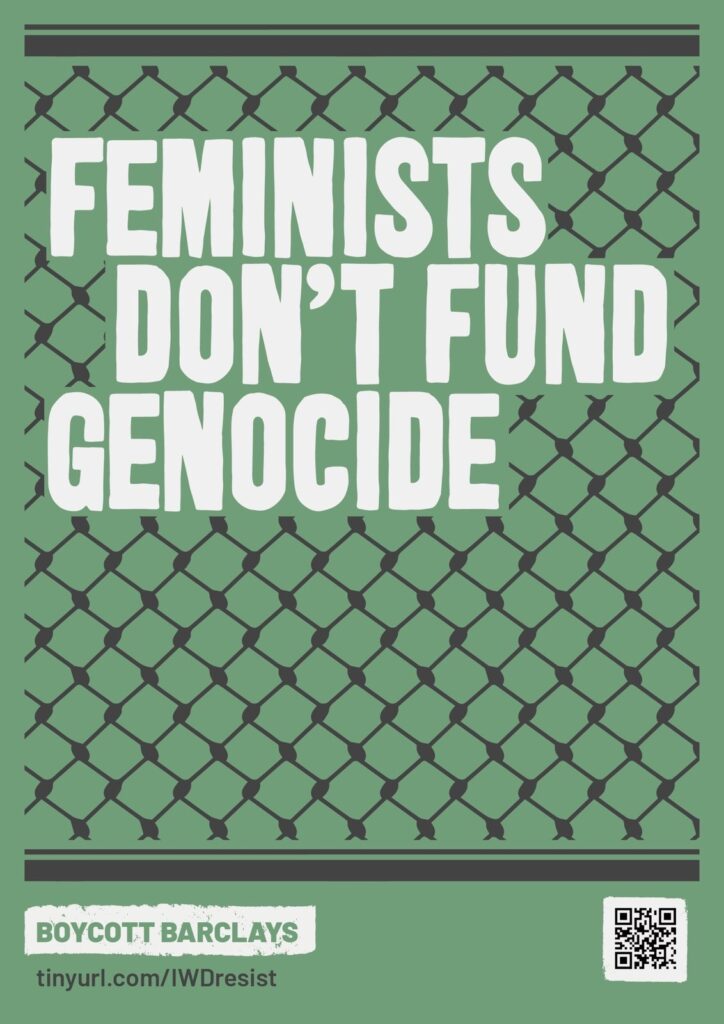
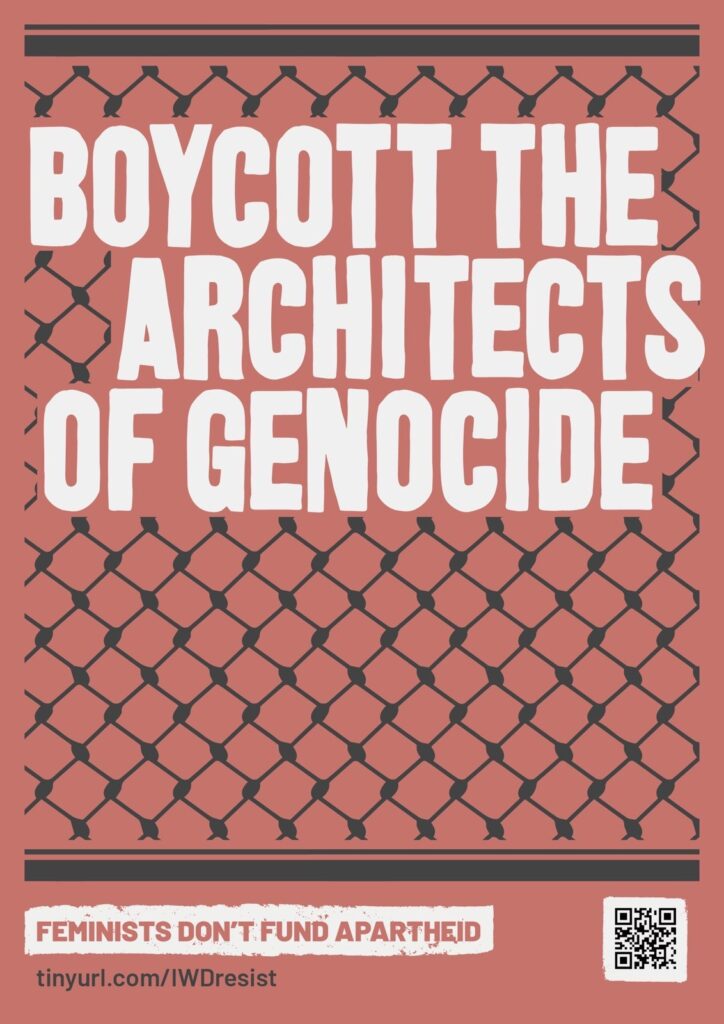
1. Moheba and Nariman “Arabiya” Khorsheed
The Khorsheed sisters founded the first women’s armed resistance organization in occupied Palestine.
Moheba and Arabiya were born and raised in Yafa, Palestine in 1920’s, when it was under colonial British Mandate, and witnessed the rise of Zionist militancy and settler occupation. They were actively involved in resistance movements in the 30’s and 40’s. At one point Moheba was called to be interrogated by British generals and went into hiding. During this time, Arabiya picked up her roles speaking at demonstrations.
In 1947, the sisters founded Zahrat at-Uqhawan (Chrysanthemum Flowers), originally an organization focused on supporting women’s rights and access to education.
While they will have witnessed colonial violence repeatedly throughout their upbringings, both sisters have shared defining moments that lead them to believe that the only way to liberation was armed resistance involving women.
When Arabiya returned home from work one day, she saw the remains of a Palestinian residential building that had been destroyed by a Zionist militia. Fuelled by rage, she spoke out in front of all her neighbours, exclaiming: “what a horrific catastrophe, what a calamity that befell the Arab countries? It is truly a tragedy so great that tongue and heart cannot describe it.” This speech got her fired from her job the next day.
Moheba witnessed a British sniper shooting a six-year-old Palestinian boy in the head in front of his mother. She claims that “on that day [she] went home and decided to take revenge.”
It was after this experience that Zahrat at-Uqhwawan transformed into an all-women armed organisation. They started funding weapons for resistance fighters and launched several militant operations. Some of their methods involved disguising themselves as men and launching surprise attacks on Zionist gangs.
Sources
- https://www.tellerreport.com/news/2021-05-15-%22the-flower-of-the-chrysanthemum%22—–the-first-feminist-organization-to-resist-the-occupation-in-palestine.Skx7F5sTOd.html
- https://www.instagram.com/p/CwGXarBRvpc/?img_index=3
- https://bazarrna.com/comrade-sisters-women-and-armed-resistance-in-palestine/
- https://novaramedia.com/2014/11/24/radical-lives-moheba-khorsheed/
2. Bisan Owda
Bisan Owda is a journalist, community activist, and filmmaker from Gaza. Bisan’s work has garnered international attention through her near daily documentation since October 8th of the ongoing genocide in Gaza. On instagram, she shares her on-the-ground experience with her growing 4.4 million followers. Israeli forces do not allow foreign press into Gaza. Documentation of the genocide has therefore been entirely reliant on Palestinian civilians and journalists like Bisan.
Bisan and other Palestinian journalists are consistent with their reporting, despite lack of internet access and regular loss of phone service, and in the midst of what has been dubbed ‘the most dangerous war for journalists’. 75% of journalists killed in 2023 were killed in Gaza, at least 103 journalists killed in 150 days. It is in this context that Bisan has become known for video introductions “It’s Bisan from Gaza, I’m still alive.”
Sources
- https://www.instagram.com/wizard_bisan1/
- https://cpj.org/reports/2024/02/israel-gaza-war-brings-2023-journalist-killings-to-devastating-high/
- https://cpj.org/2023/12/israel-gaza-war-takes-record-toll-on-journalists/
- https://rsf.org/en/103-journalists-killed-150-days-gaza-tragedy-palestinian-journalism
3. Fatima Bernawi
Fatima Bernawi was born in Jerusalem in 1939 to a Palestinian-Jordanian mother, and a Nigerian father who participated in the 1936-39 revolution in Mandatory Palestine against the British adminstration. At 9 years old, she and her mother had to flee Palestine for Jordan due to the Nakba. She later smuggled herself back into Jerusalem to reunite with her father, and lived in the African quarter of the city. She joined Fatah when she was 18.
Bernawi worked as an UNRWA nurse in Qalqilya during the 1967 occupation and witnessed Zionist onslaughts on the West Bank. Later, she cited the destruction of Qalqilya as her reason for taking up armed resistance.
Bernawi was one of the first women to plan an militant operation in Palestine. She planted a handbag containing an explosive in a cinema screening of a film celebrating the occupation of 1967. It was found before detonating and she was arrested by occupation forces on 19 October 1967. She became the first Palestinian woman political prisoner of the contemporary Palestinian revolution.
Bernawi always honoured the Palestinian women who came before her; who were imprisoned, detained, and forced into labour camps by occupation forces.
Sources
- https://samidoun.net/2022/11/remembering-fatima-bernawi-historic-palestinian-fighter-and-liberated-prisoner-1939-2022/
- https://www.palestine-studies.org/en/node/1653780
- https://www.newarab.com/news/first-ever-palestinian-woman-detained-israel-passes-away
- https://hoodcommunist.org/2023/11/02/remembering-afro-palestinian-freedom-fighter-fatima-bernawi/
4. Hind al-Husseini
Hind was born in Jerusalem in 1916 to a wealthy and politically prominent family and funnelled this wealth into educational resources and institutions, as she believed that women’s education was the path to their involvement and leadership in politics.
Hind became a teacher and took part in establishing the Social Cooperation Society for Women in Jerusalem, which had twenty-two branches in Palestine. The society studied the conditions of women and children in Palestinian villages and organized campaigns to combat illiteracy, as well as running other programs.
After the massacre in Deir Yasin in 1948, she took a group of 55 orphaned children into her home. Soon after, she established Dar al-Tifel all-Arabi, a charity to serve the needs of orphaned Palestinian children. This later became a prominent national educational institution, which included nurseries, kindergardens and schools. During the Israeli aggression in 1967, she transformed the charity into a clinic to treat the wounded. Israeli attackers shelled and destroyed the clinic, but it was later rebuilt. Later in her life, Hind founded a library and women’s college, Hind Al-Husseini College for Women, was part of Al-Quds University’s campus.
Sources:
- https://www.palquest.org/en/biography/14219/hind-al-husseini
- https://www.all4palestine.org/ModelDetails.aspx?gid=13&mid=45835&lang=en
- https://www.palestine-studies.org/en/node/1653155
- https://www.un.org/unispal/document/auto-insert-206217/
5. Hanady Halawani
Hanady Halawani was born in Jerusalem in 1980 and was educated in a school set up by Hind El-Husseini (see above). Israeli press has labelled her one of the most dangerous Palestinians in 48 Israel.
She is a religious teacher, activist, and self-appointed Murabitat (steadfast women). The Murabitat are Muslim women who practice ‘ribat’ and feel that it is their duty to protect Al-Aqsa mosque from Israeli occupiers.
The first grassroots defence of the holy mosque began in September 2000, after then-Israeli opposition leader Ariel Sharon stormed Al-Aqsa with more than 1,000 armed police and soldiers. This sparked the Second Intifada, also known as the Al-Aqsa Intifada. After this event, locals started organising groups to protect the site.
In 2011 Halawani started working as a coordinator for an educational programme that revived old practices in the courtyards of Al-Aqsa Mosque compound. Students would sit in a circle around their teachers to learn about Islam and a wide range of subjects. The program started with 50 female students, and by 2015, the figure had reached 650, in addition to 650 more male students. The group included young women, mothers and grandmothers, with ages ranging from 18 and 70 years.
In 2015, the Israeli occupation forces shut down Islamic programmes inside Al-Aqsa Mosque compound, persecuting all those who were active. Since then, Halawani has been slapped with consecutive six-month expulsion orders that have been systematically renewed. She has been banned from Al-Aqsa as well as other parts of the country on many occasions. Her family’s home is regularly raided.
Sources
- https://www.aa.com.tr/en/middle-east/freed-palestinian-activist-says-her-last-arrest-by-israel-was-the-harshest/3070809
- https://www.trtworld.com/magazine/prisoner-no-39-a-palestinian-womans-sufferings-in-israeli-detention-16330580
6. Leila Shawa
Born in Gaza City in 1940, Leila Shawa is an artist whose work confronts the harsh realities of structural violence in Palestine.
After living in Beirut during the late 1960s and early 1970s, Shawa returned to Gaza during the Lebanese Civil War. In Gaza, she played a pivotal role in birthing the Rashad Shawa Cultural Centre. This vibrant sanctuary became a haven for artistic expression, pulsating with life through art exhibitions, film screenings, and celebratory graduations. Despite its tragic demise in 2023 due to Israeli airstrikes, the spirit of the Rashad Shawa Cultural Centre persists, an enduring testament to Gaza’s indomitable spirit and collective resilience.
Shawa’s “The Walls of Gaza” series explores the physical and metaphorical barriers that confine the Palestinian people. Through her striking imagery, she translates the experience of confinement and the yearning for freedom. Shawa’s art is deeply interconnected with the history of graffiti in Gaza, a form of grassroots communication and resistance against the occupation. In a landscape scarred by conflict, graffiti is a tool for reclaiming public space and asserting Palestinian identity in the face of erasure.
Sources
- https://www.theartnewspaper.com/2022/10/28/laila-shawaa-revolutionary-palestinian-artist-who-found-international-famehas-died-aged-82
- https://octobergallery.co.uk/artists/shawa#:~:text=She%20co%2Dfounded%20the%20Rashad,wherever%20their%20roots%20may%20be
- https://artsandculture.google.com/story/the-walls-of-gaza-ii-contemporary-art-platform-kuwait/NAXxhN7aSWVkIw?hl=en
7. Sahar Khalifeh
Born in 1941 in Nablus, Sahar Khalifeh is a leading feminist writer in the anti-colonial movement. She has written eleven novels that explore the complexities of living under settler colonial occupation. Her works have been widely translated and have won major Arab and international accolades.
Before writing Novels, Khalifeh wrote resistance poetry, influenced by Mahmoud Darwish. In 1974, she published her first novel, “We Are No Longer Your Slaves,” which made headlines. Following the success of her debut, Khalifeh further cemented her reputation with her second novel, “Wild Thorns” (1976). In this work, she delves into the intersecting issues of class, gender, and settler colonialism, shedding light on the complexities of Palestinian society under occupation.
Through all her literary work, Khalifeh intricately weaves together the feminist struggle with the broader Palestinian quest for liberation.
Khalifeh now lives in Nablus, within the occupied West Bank. Here, she serves as the General Director of the Women and Family Affairs Center. In her autobiography, Khalifeh discusses the inseparable bond between women’s liberation and national struggle. She asserts: “Women’s struggle for liberation isn’t much different from that of the nation. One is as political as the other… The road to freedom is political. And freedom in any field, for any issue, has its price.”
The literary works of Sahar Khalifeh are a potent illustration of how oppression and resistance are intertwined. She explores numerous facets of injustice and challenges readers to address these injustices and work toward an equitable and more just society.
Sources
- https://lithub.com/sahar-khalifeh-on-women-and-education-in-palestine/
- https://www.themodernnovel.org/asia/arab/palestine/sahar-khalifeh/wild-thorns/
- https://www.arabicfiction.org/en/Sahar-Khalifeh-author
8. Dr Ameera Al-Assouli
Dr Ameera Al-Assouli is a retired obstetrician from Gaza. Israeli bombs destroyed her home in Abasan Al-Jadeeda, east of Khan Yunis, during the current genocide. After this, she took shelter in the besieged Al-Nasser hospital, treating the wounded and supporting the other refugees.
A video, released on 10th February, shows Dr Al-Assouli running from an inner hospital gate across the hospital courtyard amid the sound of bullets and drones, risking her own life to rescue a person who was left alone bleeding after being shot by an Israeli sniper. Reflecting on the incident, she said: “Our fear was removed from our hearts when I felt that someone needed help. I didn’t think about myself; I thought about saving people.” A few days after, Israeli occupation forces raided the hospital, cutting oxygen and electric supplies and killing patients.
Sources
- https://www.palestinechronicle.com/amira-al-assouli-palestinians-celebrate-heroic-khan-yunis-doctor-in-viral-video/
- https://www.newarab.com/news/gaza-doctor-praised-heroic-action-save-wounded-man
STAND UP FIGHT BACK
Rather than simply ‘celebrate’ these women we stand in solidarity with Palestinian feminist resistance. We call on all feminists in the United Kingdom to take all and any action they can to stand with the Palestinian people. We call on you to strike for Gaza and honour the demands of Palestinian feminists
We call on all feminists to engage in a consumer boycott of the following brands who profit from and maintain the Genocide in Gaza. https://bdsmovement.net/Act-Now-Against-These-Companies-Profiting-From-Genocide
We call on you to respect the targeted boycott of Barclays Bank – Barclays is the 6th largest creditor of companies that fund the settlements that push Palestinians out of their home. Their financial investments maintain illegal Israeli settlements in the West Bank. Barclays funds genocide.
The genocide in Palestine calls us to remember what is at stake for feminists across the world. This is an international women’s day of resistance. Join the boycott. Take to the streets and take direct action. Politically educate yourself and each other. Pressure for sanctions.
We will stand and struggle in solidarity with Palestinian resistance until the genocide stops, until the occupation ends, until we see a free Palestine.
Gaza Group, A Feminist Call to Strike for Gaza website:
“Join us on March 8th and organise with us for a global strike that will shake the thrones of the patriarchal and colonial systems. Mobilize with us the revolutionary forces that are ready to take the lead in transforming this day into a revolt against patriarchy, genocide, capitalism, and colonialism by all means possible. Through protests, sit-ins, strikes from all forms of work, both paid and unpaid, boycotting purchases and daily activities that profit the economic system, call for an arms embargo on the Zionist entity, intensify efforts seeking to prevent and disrupt the supply of weapons to it, taking platforms to speak about the Palestinian women of Gaza, blogging and writing on social media, and spreading tweets, flyers, or images bearing messages of solidarity with Gaza. Let this day be an escalation in the struggle against the genocidal war on Gaza and the Zionist settler colonial project in Palestine. Join the strike and rattle the globe in the days ahead, spurring action and affirming the incontestable fact that there can be no feminist struggle without the women of Gaza.

